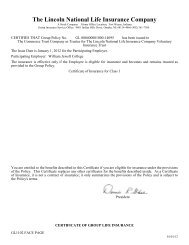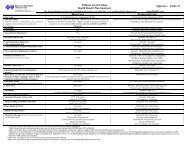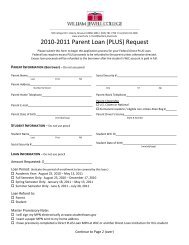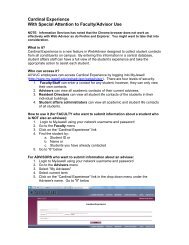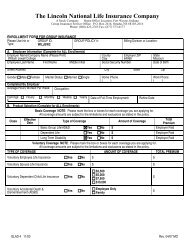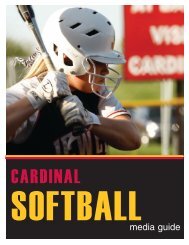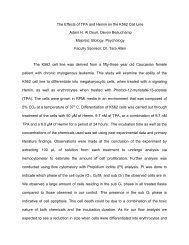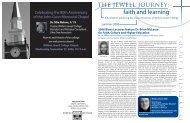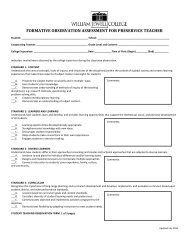Student Handbook - William Jewell College
Student Handbook - William Jewell College
Student Handbook - William Jewell College
Create successful ePaper yourself
Turn your PDF publications into a flip-book with our unique Google optimized e-Paper software.
*Every student is annually required to complete an Emergency Response Card upon arrival to campus.<br />
<strong>Student</strong>’s emergency contact information will be registered confidentially and only accessible to authorized<br />
campus officials and law enforcement personnel in furtherance of a missing person investigation.<br />
Sexual Harassment<br />
Sexual harassment is defined as unwelcome sexual advances, requests for sexual favors, and other verbal or<br />
physical conduct of a sexual nature, when:<br />
Submission to the conduct is made either explicitly or implicitly a condition of employment; or<br />
Submission to or rejection of the conduct is used as the basis for an employment decision affecting the<br />
harassed employee; or<br />
Such conduct has the purpose or effect of substantially interfering with the staff member’s work<br />
performance or creates an intimidating, hostile or offensive work environment.<br />
Prohibited acts of sexual harassment can take a variety of forms, ranging from off-color jokes to subtle<br />
pressure for sexual activity to physical assault. It is not possible to identify each and every act that may<br />
constitute sexual harassment. Examples of conduct that may constitute sexual harassment are:<br />
Repeated or unwelcome sexual flirtations, advances, propositions, touching, remarks, or requests for<br />
sexual favors;<br />
Repeated verbal abuse of a sexual nature;<br />
Graphic verbal comments about a person’s body;<br />
Sexually degrading words used to describe a person;<br />
The display of sexually suggestive objects or pictures;<br />
Unwelcome questions or comments about private sexual matters;<br />
Slurs, “off color” jokes, or degrading comments related to gender;<br />
Demeaning, discourteous conduct, or negative stereotyping; or<br />
A sexual relationship with a subordinate or a student.<br />
<strong>Student</strong> Grievances<br />
A student may wish to present a grievance against a faculty or staff member, or another student, when the<br />
issues cannot be resolved informally or by use of other regular <strong>College</strong> procedures. A grievance is a concern<br />
related to an alleged illegal or improper action not otherwise addressed in policies contained within the<br />
<strong>Student</strong> or <strong>College</strong> Employee <strong>Handbook</strong>. <strong>William</strong> <strong>Jewell</strong> <strong>College</strong> has set procedures for students who wish to<br />
present grievances. Academic related grievances, (i.e. an appeal of a course grade), should go through the<br />
Provost’s Office.<br />
The student wishing to present a grievance should file a formal written complaint with the Dean of <strong>Student</strong>s or<br />
the Assistant Dean of <strong>Student</strong>s to identify his/her particular grievance. The student should present the<br />
complaint as promptly as possible after the alleged incident and at least within 12 months of the occurrence of<br />
the incident. The formal written complaint should include the following information:<br />
Date(s) and Time(s) of the alleged incident(s);<br />
Names of all person(s) involved in the alleged situation, including possible witnesses;<br />
All details outlining what happened during the alleged incident;<br />
<strong>Student</strong>’s contact information so that the <strong>College</strong> may follow up appropriately.<br />
Page 6 of 37




